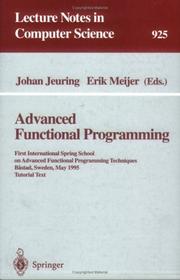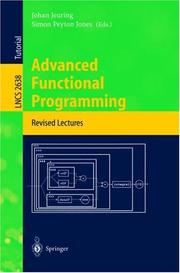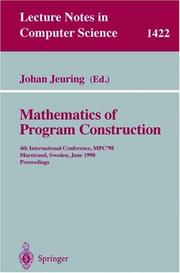| Listing 1 - 10 of 15 | << page >> |
Sort by
|
Book
Year: 1990 Publisher: Amsterdam: Centrum voor wiskunde en informatica,
Abstract | Keywords | Export | Availability | Bookmark
 Loading...
Loading...Choose an application
- Reference Manager
- EndNote
- RefWorks (Direct export to RefWorks)

ISBN: 3540594515 3540492704 9783540594512 Year: 1995 Volume: 925 Publisher: Berlin : Springer-Verlag,
Abstract | Keywords | Export | Availability | Bookmark
 Loading...
Loading...Choose an application
- Reference Manager
- EndNote
- RefWorks (Direct export to RefWorks)
This volume presents the tutorials given during the First International Spring School on Advanced Functional Programming Techniques, held in Bastad, Sweden in May 1995. The last few years have seen important new developments in functional programming techniques: concepts, such as monads, type classes, and several new special purpose libraries of higher-order functions are new and powerful methods for structuring programs. This book brings programmers, software engineers and computer scientists up-to-date with the latest techniques. Most tutorial contributions contain exercises to familiarize the reader with the new concepts and techniques, and only basic knowledge in functional programming is assumed.
Functional programming (Computer science) --- Congresses. --- Congresses --- Computer science. --- Software engineering. --- Programming Techniques. --- Software Engineering. --- Programming Languages, Compilers, Interpreters. --- Computer software engineering --- Engineering --- Informatics --- Science --- Functional programming (Computer science) - Congresses.
Book
ISBN: 3642313736 3642313744 Year: 2012 Publisher: Berlin ; New York : Springer,
Abstract | Keywords | Export | Availability | Bookmark
 Loading...
Loading...Choose an application
- Reference Manager
- EndNote
- RefWorks (Direct export to RefWorks)
This book constitutes the joint refereed proceedings of the 11th International Conference on Artificial Intelligence and Symbolic Computation, AISC 2012, 19th Symposium on the Integration of Symbolic Computation and Mechanized Reasoning, Calculemus 2012, 5th International Workshop on Digital Mathematics Libraries, DML 2012, 11th International Conference on Mathematical Knowledge Management, MKM 2012, Systems and Projects, held in Bremen, Germany as CICM 2012, the Conferences on Intelligent Computer Mathematics. The 13 revised full papers out of 19 submissions for MKM 2012, 6 revised full papers out of 9 submissions for Calculemus 2012, 6 revised full papers out of 8 submissions for AISC 2012, 2 revised full papers out of 3 submissions for DML 2012, and 11 revised full papers out of 12 submissions for Systems and Project track presented were carefully reviewed and selected, resulting in 38 papers from a total of 52 submissions.
Engineering & Applied Sciences --- Computer Science --- Computer science --- Artificial intelligence --- Mathematics --- AI (Artificial intelligence) --- Artificial thinking --- Electronic brains --- Intellectronics --- Intelligence, Artificial --- Intelligent machines --- Machine intelligence --- Thinking, Artificial --- Computer science. --- Computer logic. --- Mathematical logic. --- Information storage and retrieval. --- Artificial intelligence. --- Computer Science. --- Symbolic and Algebraic Manipulation. --- Artificial Intelligence (incl. Robotics). --- Math Applications in Computer Science. --- Mathematical Logic and Formal Languages. --- Logics and Meanings of Programs. --- Information Storage and Retrieval. --- Mathematics. --- Bionics --- Cognitive science --- Digital computer simulation --- Electronic data processing --- Logic machines --- Machine theory --- Self-organizing systems --- Simulation methods --- Fifth generation computers --- Neural computers --- Computer mathematics --- Discrete mathematics --- Algebra of logic --- Logic, Universal --- Mathematical logic --- Symbolic and mathematical logic --- Symbolic logic --- Algebra, Abstract --- Metamathematics --- Set theory --- Syllogism --- Computer science logic --- Logic, Symbolic and mathematical --- Informatics --- Science --- Algebra --- Logic design. --- Information storage and retrieva. --- Artificial Intelligence. --- Data processing. --- Design, Logic --- Design of logic systems --- Digital electronics --- Electronic circuit design --- Logic circuits --- Switching theory --- Information storage and retrieval systems. --- Automatic data storage --- Automatic information retrieval --- Automation in documentation --- Computer-based information systems --- Data processing systems --- Data storage and retrieval systems --- Discovery systems, Information --- Information discovery systems --- Information processing systems --- Information retrieval systems --- Machine data storage and retrieval --- Mechanized information storage and retrieval systems --- Computer systems --- Electronic information resources --- Data libraries --- Digital libraries --- Information organization --- Information retrieval --- Computer science—Mathematics.
Dissertation
Abstract | Keywords | Export | Availability | Bookmark
 Loading...
Loading...Choose an application
- Reference Manager
- EndNote
- RefWorks (Direct export to RefWorks)
Book
ISBN: 3319501828 331950181X Year: 2016 Publisher: Cham : Springer International Publishing : Imprint: Springer,
Abstract | Keywords | Export | Availability | Bookmark
 Loading...
Loading...Choose an application
- Reference Manager
- EndNote
- RefWorks (Direct export to RefWorks)
This book constitutes the refereed proceedings of the 5th International Conference on Games and Learning Alliance, GALA 2016, held in Utrecht, The Netherlands, in December 2016. The 27 revised regular papers presented together with 14 poster papers were carefully reviewed and selected from 55 submissions. The papers cover topics such as games and sustainability; games for math and programming; games and health; games and soft skills; games and management; games and learning; game development and assessment; and mobile games.
Computer science. --- Computer communication systems. --- Artificial intelligence. --- Application software. --- Education --- Personal computers. --- Computer Science. --- Personal Computing. --- Computers and Education. --- Computer Appl. in Social and Behavioral Sciences. --- Artificial Intelligence (incl. Robotics). --- Computer Communication Networks. --- Data processing. --- Home computers --- Micro computers --- Micros (Microcomputers) --- PCs (Microcomputers) --- Personal computers --- Small computers --- Computer uses in education --- Computers in education --- Educational computing --- Microcomputer uses in education --- Microcomputers in education --- Application computer programs --- Application computer software --- Applications software --- Apps (Computer software) --- AI (Artificial intelligence) --- Artificial thinking --- Electronic brains --- Intellectronics --- Intelligence, Artificial --- Intelligent machines --- Machine intelligence --- Thinking, Artificial --- Communication systems, Computer --- Computer communication systems --- Data networks, Computer --- ECNs (Electronic communication networks) --- Electronic communication networks --- Networks, Computer --- Teleprocessing networks --- Informatics --- Minicomputers --- Computer software --- Bionics --- Cognitive science --- Digital computer simulation --- Electronic data processing --- Logic machines --- Machine theory --- Self-organizing systems --- Simulation methods --- Fifth generation computers --- Neural computers --- Data transmission systems --- Digital communications --- Electronic systems --- Information networks --- Telecommunication --- Cyberinfrastructure --- Network computers --- Science --- Distributed processing --- Education. --- Social sciences --- Artificial Intelligence. --- Children --- Education, Primitive --- Education of children --- Human resource development --- Instruction --- Pedagogy --- Schooling --- Students --- Youth --- Civilization --- Learning and scholarship --- Mental discipline --- Schools --- Teaching --- Training --- Computer networks. --- Education—Data processing.

ISBN: 3540448330 3540401326 Year: 2003 Publisher: Berlin, Heidelberg : Springer Berlin Heidelberg : Imprint: Springer,
Abstract | Keywords | Export | Availability | Bookmark
 Loading...
Loading...Choose an application
- Reference Manager
- EndNote
- RefWorks (Direct export to RefWorks)
Functional programming (Computer science) --- Computer Science --- Engineering & Applied Sciences --- Computer science. --- Computer programming. --- Software engineering. --- Programming languages (Electronic computers). --- Computer logic. --- Computer Science. --- Programming Techniques. --- Software Engineering. --- Programming Languages, Compilers, Interpreters. --- Logics and Meanings of Programs. --- Computer science logic --- Logic, Symbolic and mathematical --- Computer languages --- Computer program languages --- Computer programming languages --- Machine language --- Electronic data processing --- Languages, Artificial --- Computer software engineering --- Engineering --- Computers --- Electronic computer programming --- Electronic digital computers --- Programming (Electronic computers) --- Coding theory --- Informatics --- Science --- Programming --- Logic design. --- Design, Logic --- Design of logic systems --- Digital electronics --- Electronic circuit design --- Logic circuits --- Machine theory --- Switching theory
Book
ISBN: 9789077647530 Year: 2011 Publisher: Zoetermeer Kennisnet
Abstract | Keywords | Export | Availability | Bookmark
 Loading...
Loading...Choose an application
- Reference Manager
- EndNote
- RefWorks (Direct export to RefWorks)
Digital
ISBN: 9783540767862 Year: 2007 Publisher: Berlin, Heidelberg Springer-Verlag Berlin Heidelberg
Abstract | Keywords | Export | Availability | Bookmark
 Loading...
Loading...Choose an application
- Reference Manager
- EndNote
- RefWorks (Direct export to RefWorks)
Computer science --- Programming --- Computer. Automation --- programmeren (informatica) --- database management --- programmeertalen --- software engineering --- programmatielogica

ISSN: 03029743 ISBN: 3540645918 9783540645917 3540693459 Year: 1998 Volume: 1422 Publisher: Berlin, Heidelberg : Springer Berlin Heidelberg : Imprint: Springer,
Abstract | Keywords | Export | Availability | Bookmark
 Loading...
Loading...Choose an application
- Reference Manager
- EndNote
- RefWorks (Direct export to RefWorks)
This book consitutes the refereed proceedings of the 4th International Conference on Mathematics of Program Construction, MPC'98, held in Marstrand, near Goteborg, Sweden, in June 1998. The 17 revised full papers presented were selected from 57 submissions; also included are three invited contributions. The volume is devoted to the use of crisp, clear mathematics in the discovery and design of algorithms and in the development of corresponding software and hardware; varoius approaches to formal methods for systems design and analysis are covered.
Computer programming --- Computer science --- Mathematics --- Computer science. --- Software engineering. --- Computer programming. --- Computers. --- Algorithms. --- Computer logic. --- Computer Science. --- Theory of Computation. --- Software Engineering/Programming and Operating Systems. --- Programming Techniques. --- Software Engineering. --- Algorithm Analysis and Problem Complexity. --- Logics and Meanings of Programs. --- Computer science logic --- Logic, Symbolic and mathematical --- Algorism --- Algebra --- Arithmetic --- Automatic computers --- Automatic data processors --- Computer hardware --- Computing machines (Computers) --- Electronic brains --- Electronic calculating-machines --- Electronic computers --- Hardware, Computer --- Computer systems --- Cybernetics --- Machine theory --- Calculators --- Cyberspace --- Computers --- Electronic computer programming --- Electronic data processing --- Electronic digital computers --- Programming (Electronic computers) --- Coding theory --- Computer software engineering --- Engineering --- Informatics --- Science --- Foundations --- Programming --- Congresses --- Information theory. --- Computer software. --- Logic design. --- Design, Logic --- Design of logic systems --- Digital electronics --- Electronic circuit design --- Logic circuits --- Switching theory --- Software, Computer --- Communication theory --- Communication --- Computer programming - Congresses --- Computer science - Mathematics - Congresses
Book
ISBN: 9783540767862 Year: 2007 Publisher: Berlin, Heidelberg Springer-Verlag Berlin Heidelberg
Abstract | Keywords | Export | Availability | Bookmark
 Loading...
Loading...Choose an application
- Reference Manager
- EndNote
- RefWorks (Direct export to RefWorks)
A leitmotif in the evolution of programming paradigms has been the level and extent of parametrisation that is facilitated the so-called genericity of the paradigm. The sorts of parameters that can be envisaged in a programming language range from simple values, like integers and ?oating-point numbers, through structured values, types and classes, to kinds (the type of types and/or classes).Datatype-generic programming is about parametrising programsby the structure of the data that they manipulate. Toappreciatethe importanceofdatatypegenericity,oneneedlooknofurther than the internet. The internet is a massive repository of structured data, but the structure is rarely exploited. For example, compression of data can be much more e?ective if its structure is known, but most compression algorithms regard the input data as simply a string of bits, and take no account of its internal organisation. Datatype-genericprogrammingisaboutexploitingthestructureofdatawhen it is relevant and ignoring it when it is not. Programming languages most c- monly used at the present time do not provide e?ective mechanisms for do- menting and implementing datatype genericity. This volume is a contribution towards improving the state of the art. The emergence of datatype genericity can be traced back to the late 1980s.
Computer science --- Programming --- Computer. Automation --- programmeren (informatica) --- database management --- programmeertalen --- software engineering --- programmatielogica
| Listing 1 - 10 of 15 | << page >> |
Sort by
|

 Search
Search Feedback
Feedback About UniCat
About UniCat  Help
Help News
News